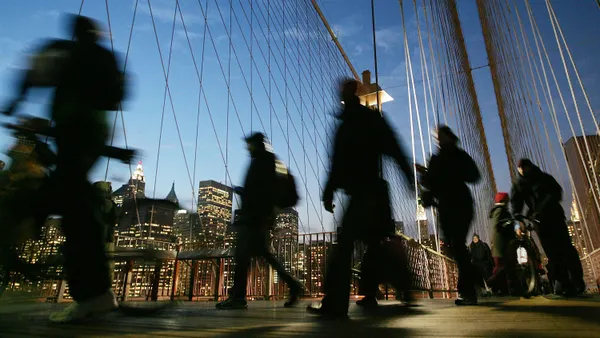Dive Brief:
- People of color represent almost half (46%) of the employed restaurant workforce in Seattle, but are more likely to have less visible, lower-wage jobs at fine-dining restaurants, according to research. Restaurant Opportunities Centers United (ROC) and the Seattle Office for Civil Rights (OCR) released a report July 24 on restaurant hiring practices in the city and the experiences of people of color working in the establishments.
- The data is based on the results of matched pair audit tests of 100 fine-dining restaurants conducted by OCR between August 2017 and November 2018. The research was conducted by having two qualified applicants, who were matched on all characteristics except for race and ethnicity, apply for restaurant positions. Back of house or kitchen positions, and front-of-house positions, where employees are visible on the dining floor, are highly segregated by ethnicity and race, according to the report. Less than a quarter (18%) of bartenders are people of color, for example.
- There was evidence of bias in favor of White testers in almost half (49%) of the tests. Meanwhile, 34% of tests found evidence of equal treatment, and 17% showed evidence of treatment favoring Black and Latinx testers. However, of the tests that favored White applicants, 6.1% resulted in offers for jobs, 18.4% resulted in call-backs, and 36.7% "showed strong evidence of bias against applicants of color,” the report stated. OCR also found that in about 10% of the tests, people of color were told to apply to ethnic-themed restaurants or out-of-town restaurants.
Dive Insight:
Title VII of the federal Civil Rights Act of 1964 makes it illegal for employers to discriminate based on several protected classes, including race and gender. Amid national calls for racial justice, the U.S. Equal Employment Opportunity Commission (EEOC) recently committed to "redouble” its enforcement of the law.
The EEOC issued a resolution June 9 to condemn "the senseless deaths of George Floyd, Breonna Taylor, Ahmaud Arbery and countless others." The government agency will "redouble" its "efforts to address institutionalized racism, advance justice and foster equality of opportunity in the workplace," the resolution stated.
HR plays a significant role in ensuring employment decisions are not based on protected characteristics. Compliance experts who previously spoke with HR Dive suggested training for managers and supervisors on the requirements of local, state and federal anti-discrimination laws. Discrimination in hiring is of particular concern amid the COVID-19 pandemic as restaurants reopen in Seattle, located in King County, Washington, where the board of health declared racism a public health emergency in June.
"The industry must commit itself to ensure racial equity in the reopening and rehiring of employees and provide earning opportunities for Black, Indigenous and people of color in order to dismantle the structural racism that exists in the restaurant industry,” the report stated.













